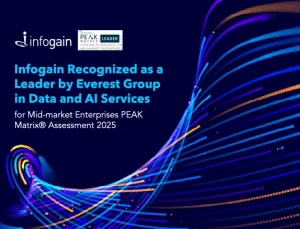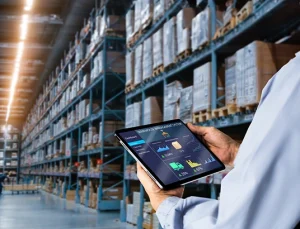- Posted on : June 14, 2017
-
- Industry : Digital and High Technology
- Type: News

By Mr. Ramesh Subramanian, Chief Technology Officer, Infogain.
This is a sentiment that echoes across the industry corridors nowadays. Technological advancements and digital transformations are drastically changing the way we do business today. Technologies like Big Data, Internet of Things (IoT), Artificial Intelligence/ Machine Learning (AI/ ML) are the new buzzwords of today, transforming user experience, engaging the consumer, analyzing patterns and enabling proactive and real-time response. On the one hand technology innovations are challenging existing business models like never before. Businesses are having to re-think everything that they do today from the “new” consumer perspective, lest they risk their own survival in the digital age. While on the other hand, technology has become a lever for agile and forward thinking enterprises to race ahead of the pack and create a differentiation within their respective markets by building smart, intuitive solutions.
“Information technology is at the core of how you do your business and how your business model itself evolves”. Satya Nadella
The focus today is on speed, flexibility, and consumer choice more than ever as traditional firms are having to contend with frequent comparisons to the likes of Google, Amazon, and Facebook, even in the enterprise space.
Intelligence and automation combined can change the way business is done across all sectors of the economy. Intelligent automation systems sense and synthesize vast amounts of information can automate entire processes or workflows, learning and adapting as they go and give consumers an experience that is highly customized to their tastes and preferences. Artificial Intelligence (AI) takes personalization to the next level as AI, in the form of Machine Learning (ML), can predict and personalize answers to customers’ queries and requests. This trend enables marketers to have one-on-one customers’ conversations by applying data points from social media posts, browsing and purchasing histories, and past customer interactions to get a complete view of every customer. This enables us to predict the next sale or marketing opportunity for each customer and automates multiple manual steps to improve the customer’s experience. An early example of such technology is the deployment of “shopping assistants” or “chatbots” of varying nature by almost all retailing companies. Chatbots record interactions with individual customers, the various outcomes, the suggestions, and responses, etc. Big Data repositories supply other information such as clickstreams from all interactions so far, past track records, public information, etc. Knowledge Management and ML can then allow such chatbots to update their behavior so that the next interaction incorporates the sum total of all past knowledge and a prediction for future outcomes based on immediate and individual conversation. Such chatbots can “understand” and respond to human queries intelligently helping them to solve problems, some before they have even arisen.
Ray Kurzweil, the famous American author, computer scientist, inventor, and futurist said that Artificial intelligence will reach human levels by around 2029. Machines are becoming more intelligent and capable each day in performing tasks that need narrow as well as broad intelligence. Traditionally machines were envisaged to automate tasks that involved a great deal of repetition or standardized, hazardous tasks with great quality and less management overheads to deliver better outcomes. Machines today can manage information, connect with vast data sources, analyze and pull out the right information/ insights with minimum human intervention. Software can learn and intelligently interpolate and extrapolate data. More importantly, it can learn and adapt.
A report released by Business Insider states that by the year 2020, about 34 billion devices will be connected to the internet with apps and software that will collect data from customers like geo location, search history, browsing habits etc. but all in un-intrusive ways, thus, eliminating the burden of data capture that creates privacy concerns. Big industry players like Google, Apple, Facebook, Microsoft, Amazon, IBM, etc., are paving the way by embracing advanced technologies like AI, ML as well as their Digital Assistants such as Siri, Cortana, Alexa, etc. With the involvement of intelligent systems like robots in the workplace, businesses will soon witness a multi-faceted shift. It is inevitable that as the intelligent systems including robots and IoT devices become all pervasive, the connection between humans and smart systems will affect the ecosystem intensely. Amazon recently launched the first ‘self-driving’ grocery store, Amazon Go with no checkout lines, in Seattle in early 2017. Walmart, is experimenting with robot shopping carts. Walmart also said it was testing whether drones could help check the inventory in its stores. And Elon Musk is teaching robots new tricks through Virtual Reality lessons!
With all the brave forecasts and hype, there are still some very old and extremely pertinent caveats for the new age. The experience of IBM’s Watson at a cancer cure hospital in Texas is a case in point- the rules of prioritizing business value and good governance have never been more important.
According to experts, the robot-based workforce will take over 30 percent of jobs by 2025. Consequently, some jobs will be lost, while some new jobs will be created. All these examples paint a truly fantastic picture of where intelligence and automation can take us in the future. It also brings into question what traditional firms in each of these sectors need to do in order to cope with such technological revolution.
The best way to survive in these ever-changing digitization trends is to constantly improve the customer experience through innovation. One thing is clear that with intelligent software and hardware and their synthesis into automation the company of future will look very different- but to survive and thrive, it will still need the same emphasis on process, governance, and alignment to strategy.
News Originally Posted on: PC Quest






